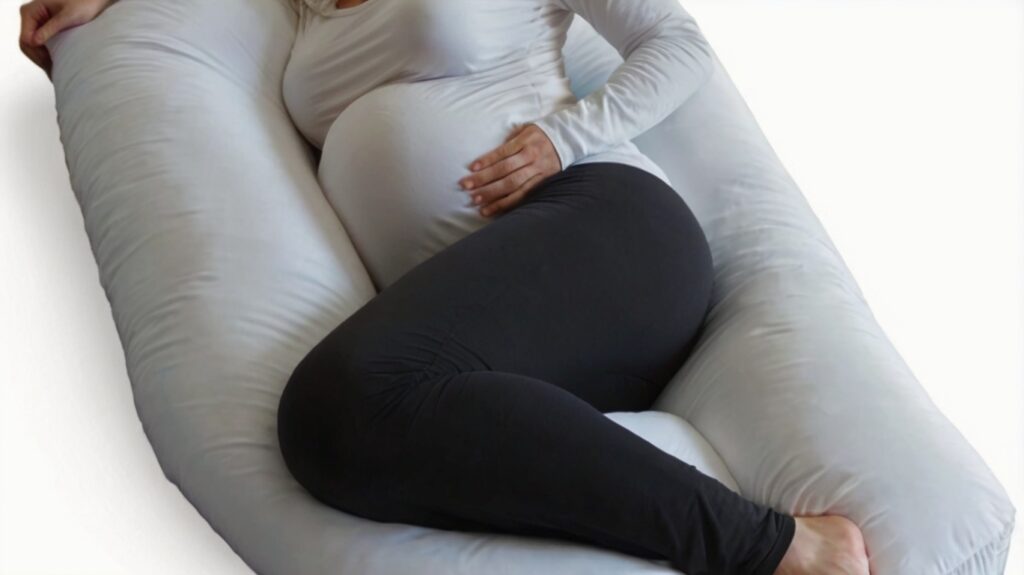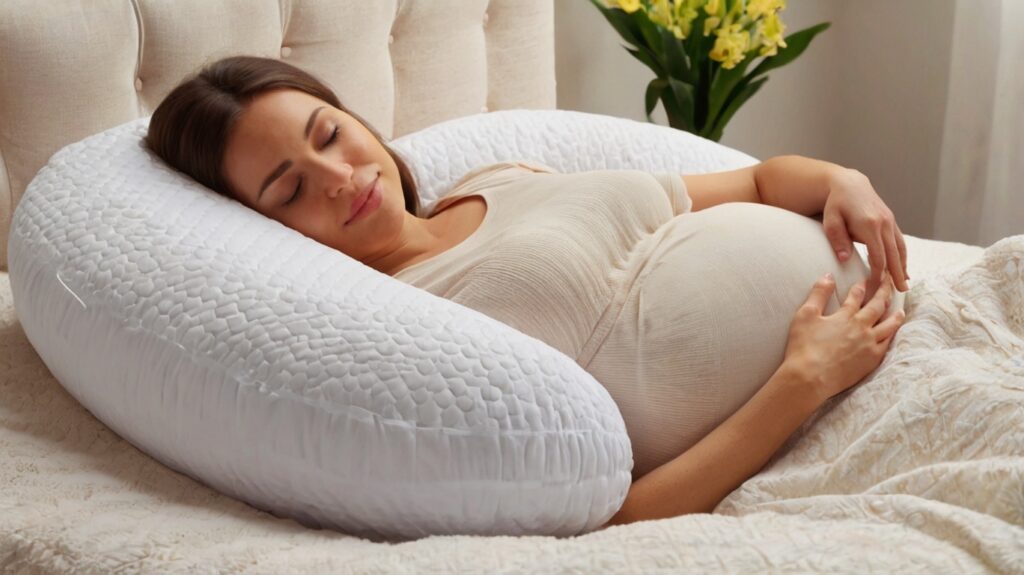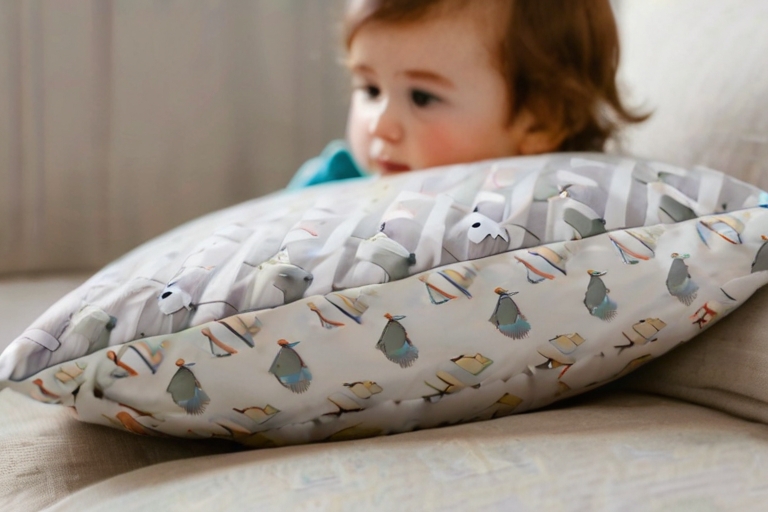Pregnancy is a time of joy and excitement but it also comes with its fair share of challenges. One of the most common issues pregnant women face is getting a good sleep. As the body changes, finding a comfortable sleeping position becomes increasingly difficult. To eliminate this discomfort, many expectant mothers turn to pregnancy pillows. These pillows are designed to support the body and improve sleep quality. However, despite their benefits, there are some hidden side effects of pregnancy pillow use that many might not be aware of. Let’s discuss these lesser known issues.
What is a Pregnancy Pillow?

Pregnancy pillows are specially designed pillows that provide support to various parts of the body, particularly the abdomen, back and legs, to help pregnant women sleep more comfortably. They come in various shapes and sizes, including U-shaped, C-shaped and wedge pillows, each tailored to provide specific types of support.
Benefits of Pregnancy Pillows
Before we explore the side effects of pregnancy pillows, it’s essential to acknowledge their benefits. These pillows can significantly improve sleep quality, alleviate pain and discomfort and provide the necessary support to the body during pregnancy. They help in maintaining proper alignment of the spine, reducing pressure on the hips and back and improving overall comfort.
Side Effects of Pregnancy Pillows

While pregnancy pillows can be a lifesaver, they are not without their drawbacks. Here are five hidden side effects of pregnancy pillow use that you should be aware of:
1. Musculoskeletal Problems
One of the significant side effects of pregnancy pillow use is the potential for musculoskeletal problems. While these pillows are designed to support the body, incorrect use or choosing the wrong type of pillow can lead to issues with posture and alignment. For instance, a pillow that is too high or too low can misalign the spine, leading to chronic back and neck pain. This misalignment can worsen pre-existing conditions such as sciatica or lumbar pain, which are already common during pregnancy.
Long-term Impact on Posture
Pregnancy pillows are often used for extended periods, starting from the second trimester until the baby is born. Prolonged use of an improperly supportive pillow can cause long-term postural issues. This is particularly concerning as the body undergoes significant strain during pregnancy, with added weight and a shifting center of gravity. When a pregnancy pillow does not provide adequate support, it can lead to persistent issues with alignment that may extend well beyond the pregnancy period, potentially requiring prolonged physical therapy or chiropractic care to correct.
Exacerbation of Pre-existing Conditions
Pregnant women who already suffer from conditions such as scoliosis, herniated discs, or arthritis may find that an inappropriate pregnancy pillow exacerbates these issues. The additional weight and pressure from a growing baby already strain the body, and an ill-fitting pillow can worsen symptoms, leading to increased pain and discomfort. It is essential for women with pre-existing conditions to consult healthcare professionals before selecting a pregnancy pillow to ensure it will provide the necessary support without causing harm.
2. Respiratory Issues
Another one of the significant side effects of pregnancy pillow use is the potential for respiratory issues. Pregnancy pillows can accumulate dust mites, mold and other allergens, especially if not cleaned regularly. These allergens can worsen respiratory conditions such as asthma or cause new allergic reactions, leading to symptoms like wheezing, coughing and shortness of breath.
Impact on Maternal and Fetal Health
For pregnant women, maintaining good respiratory health is crucial as any compromise can affect both the mother and the developing baby. Restricted breathing caused by allergens can reduce oxygen levels, potentially leading to complications. For instance, maternal hypoxia (reduced oxygen levels in the mother’s blood) can impact fetal development, potentially leading to issues such as low birth weight, preterm birth or developmental delays.
The Role of Pillow Materials
The materials used in pregnancy pillows can play a significant role in respiratory health. Pillows made from synthetic materials are more likely to harbor allergens compared to those made from natural, breathable fibers. Expecting mothers should opt for pillows made from hypoallergenic and breathable materials such as organic cotton or bamboo. Additionally, ensuring the pillow has a removable and washable cover can help maintain hygiene and reduce allergen buildup.
3. Circulatory Problems
Improper use of pregnancy pillows can also lead to circulatory problems. Some pregnancy pillows are designed to support side sleeping, which is recommended during pregnancy to improve blood flow. However, if the pillow is not positioned correctly, it can put pressure on certain blood vessels, leading to impaired circulation. This can cause numbness, tingling or even swelling in the limbs.
Risks of Deep Vein Thrombosis (DVT)
Severe circulatory issues can lead to conditions such as deep vein thrombosis (DVT), a serious and potentially life-threatening condition where blood clots form in the deep veins of the body. Pregnant women are already at a higher risk for DVT due to increased blood volume and hormonal changes that affect blood clotting. The improper use of pregnancy pillows can worsen this risk by impeding proper blood flow, particularly in the legs.
Symptoms and Prevention
Symptoms of DVT include swelling, pain and redness in the affected limb. Pregnant women should be vigilant about these signs and seek medical attention immediately if they occur. To prevent circulatory problems, it is important to use the pregnancy pillow correctly, ensuring it supports proper alignment without putting undue pressure on any part of the body. Regular movement, stretching and avoiding prolonged periods in one position can also help maintain healthy circulation.
4. Skin Irritations and Infections
Pregnancy pillows can also pose a risk of skin irritations and infections. The materials used in some pillows may not be breathable, causing excessive sweating and creating a moist environment that is conducive to bacterial and fungal growth. Prolonged contact with such an environment can lead to skin irritations and even infections.
Common Skin Issues
Excessive sweating and moisture accumulation can lead to conditions such as heat rash or fungal infections like athlete’s foot or yeast infections. Pregnant women are particularly susceptible to skin irritations due to hormonal changes that can affect skin sensitivity and immune response.
Choosing the Right Materials
To avoid these issues, it is important to choose pregnancy pillows made from breathable, moisture-wicking fabrics. Natural fibers such as cotton or bamboo are preferable as they allow for better air circulation and reduce the risk of moisture buildup. Additionally, using a removable and washable pillow cover can help maintain cleanliness and reduce the risk of bacterial and fungal growth.
5. Sleep Disruptions
While pregnancy pillows are intended to enhance sleep quality, they can sometimes have the opposite effect. The bulkiness of some pregnancy pillows can make it difficult to find a comfortable position, leading to frequent tossing and turning throughout the night. This can result in fragmented sleep and overall sleep deprivation, which can have serious health consequences.
Impact on Mental Health
Chronic sleep deprivation can weaken the immune system, increase the risk of gestational diabetes and hypertension and contribute to mood disorders such as anxiety and depression. For expecting mothers, ensuring adequate and restful sleep is critical for both maternal and fetal health. Sleep deprivation during pregnancy can exacerbate pregnancy-related anxiety and depression, which can have long-term effects on both the mother and baby.
Finding the Right Fit
If a pregnancy pillow is causing sleep disruptions, it may be necessary to try different types or configurations of pillows or seek alternatives to improve sleep quality. Some women find that a combination of smaller pillows strategically placed around the body can provide better support without the bulkiness of a full-body pregnancy pillow. It may also be helpful to consult with a healthcare provider or a sleep specialist to identify the best sleep solutions for individual needs.
Mitigating the Side Effects of Pregnancy Pillow Use

Understanding the serious side effects of pregnancy pillow use is the first step in mitigating them. Here are some strategies to help expecting mothers get the most out of their pregnancy pillow while minimizing the risks.
Proper Selection and Use
Choosing the right pregnancy pillow and using it correctly are crucial in avoiding musculoskeletal problems and other issues. Expecting mothers should consider factors such as their body type, preferred sleeping position and specific areas of discomfort when selecting a pregnancy pillow. Consulting with a healthcare provider or a physical therapist can provide additional guidance.
Must Read: How to use pregnancy Pillow
Types of Pregnancy Pillows
There are several types of pregnancy pillows, each designed to provide support in different ways:
- U-Shaped Pillows: These provide full-body support, cradling the entire body and supporting the back, belly and legs.
- C-Shaped Pillows: These wrap around the body in a C-shape, supporting the head, belly, and legs.
- Wedge Pillows: These are smaller and can be placed under the belly or between the knees to provide targeted support.
- J-Shaped Pillows: These offer support for the head, neck and belly, and can be easier to maneuver than U-shaped pillows.
Selecting the right type based on individual needs can help maximize comfort and minimize the risk of side effects of pregnancy pillow.
Regular Cleaning
To reduce the risk of respiratory issues and skin irritations, regular cleaning of the pregnancy pillow and its cover is essential. Following the manufacturer’s care instructions can help maintain the cleanliness and prolong its lifespan. Using hypoallergenic pillow covers can provide an extra layer of protection against allergens and bacteria.
Proper Positioning
Ensuring proper positioning of the pregnancy pillow is vital to prevent circulatory problems and improve sleep quality. Experimenting with different positions and configurations can help find the most comfortable and supportive setup. It may also be helpful to use additional pillows to support specific areas such as the lower back or knees.
Monitoring Health
Expecting mothers should monitor their health closely and be aware of any signs of the side effects discussed in this article. If any severe side effects of pregnancy pillow are experienced, it is important to seek medical attention promptly.
Conclusion
Pregnancy pillows can provide much-needed relief and support during a challenging time, but it is important to be aware of their potential side effects. By understanding the hidden side effects of pregnancy pillow use and taking steps to mitigate them, expecting mothers can enjoy the benefits of these pillows while minimizing the risks. Ultimately, the goal is to ensure that the pregnancy pillow enhances the well-being of both the mother and the developing baby, contributing to a healthier and more comfortable pregnancy experience.
FAQs
Can pregnancy pillows cause back pain?
Yes, if not used correctly or if the pillow is not supportive enough, it can cause or worsen back pain by misaligning the spine.
How often should I clean my pregnancy pillow?
It is recommended to clean the pillow cover weekly and the pillow itself according to the manufacturer’s instructions, typically every few months.
Are there hypoallergenic pregnancy pillows available?
Yes, many brands offer hypoallergenic options made from natural, breathable materials like organic cotton or bamboo.
Can a pregnancy pillow help with sciatica?
Yes, a properly supportive pregnancy pillow can help alleviate sciatica by providing better alignment and reducing pressure on the sciatic nerve.
What should I do if my pregnancy pillow causes skin irritation?
Ensure the pillow is made from breathable materials, keep it clean and consider using a hypoallergenic cover. If irritation persists, consult with a healthcare provider.

I am a scientific researcher, passionate about the science of comfort. On this blog, I share comprehensive information about pillows, combining my expertise and research to help you find the perfect pillow for your needs.


Your point of view caught my eye and was very interesting. Thanks. I have a question for you.